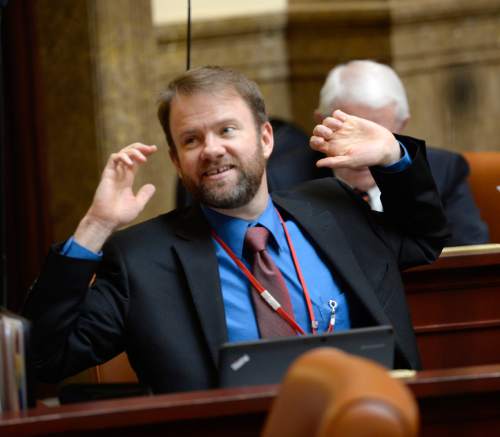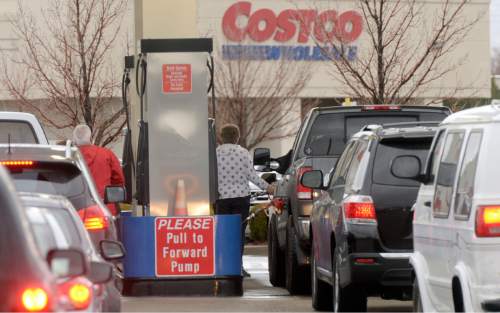This is an archived article that was published on sltrib.com in 2015, and information in the article may be outdated. It is provided only for personal research purposes and may not be reprinted.
Legislative leaders signaled Tuesday that taxes for transportation almost surely will go up this year and likely will undergo a vast transformation, too.
That includes a proposal not only to increase gasoline tax — maybe by 10 cents a gallon — but also to restructure it so that it could automatically adjust once a year to keep pace with inflation.
Lawmakers are also proposing to let counties increase their sales tax by a quarter-cent per dollar purchase to help fund local road projects, although areas with mass transit systems would be required to use much of the extra revenue for bus and train service.
Finally, they propose to raise registration fees on electric or alternative-fuel vehicles. The owners now pay little or no gasoline tax. Lawmakers say that would help ensure they pay their fair share for road maintenance and construction.
"We have talked about concepts now for two years," House Transportation Committee Chairman Johnny Anderson, R-Taylorsville, told a forum of the Utah Highway Users Association. "Know that the work is about to be done" to raise tax for transportation.
The Legislature is trying to cover an estimated $11 billion shortfall for priority projects in the state's unified transportation plan through 2040. The state has even stopped maintaining some rural highways for lack of money.
Anderson said the House GOP Caucus last month endorsed not only transportation-tax hikes, but also the idea to "dump our antiquated" tax system for one that automatically keeps up with inflation and makes those now escaping gas tax contribute.
Senate President Wayne Niederhauser, R-Sandy, told the forum that the Senate has not yet bought into the idea of reforming the tax system, but it probably supports tax increases for transportation.
"Personally, I feel like we just need to buck up and increase the gasoline tax" without changing its structure, he said.
The state gasoline tax is currently a flat 24.5 cents per gallon. It has not been increased since 1997. "To capture the inflation that we have lost in the past 15 years, we would need to increase gas tax by 10 cents a gallon," Niederhauser said.
He adds that the current cents-per-gallon tax is stable and allows accurate projections for revenue, but raising it is politically difficult "because it is the second-most hated tax" behind property tax.
Anderson said he is writing legislation that would change the current per-gallon gasoline tax to a percentage tax on the price of fuel.
He said revenues would then rise (or drop) with the price of gasoline without the Legislature needing to act.
That percentage likely would be adjusted by formula once a year based on gasoline price averages for the previous 12 to 18 months to help smooth out the effect of price volatility on revenues, Anderson said.
Formulas would include floors to prevent revenues from dropping too low, and ceilings to prevent too much of a windfall if gas prices increase rapidly.
Niederhauser said he worries that wide fluctuations in the price of gasoline could hurt stable transportation funding and planning. "We've got to balance volatility with the pain of future legislatures in having to raise the gas tax," he said.
Anderson said he is also writing legislation to allow counties to raise sales tax by a quarter-cent to help fund county and city road projects. But in areas with transit systems, he would require perhaps 60 percent of that to go to transit.
Such areas would then be allowed to increase their sales tax even further to make up for some of the amount diverted to transit.
Anderson said he is designing his plan that way — funding some transit before such counties could get full funding for local roads — to ensure transit agencies obtain money for their priority projects in the state transportation plan.
However, House Majority Leader Jim Dunnigan, R-Taylorsville, questioned that approach Tuesday, and told the forum that he would prefer simply allowing counties to decide how much to provide for transit.
Anderson said he is simply outlining starting points for debate, "and heaven only knows what it will look like in the end."
He also is proposing to raise registration fees for vehicles that are electric, use other alternative fuels or offer high gas mileage.
Because they buy less gasoline, they largely escape fuel tax now. "It's time we begin to look at fair and equal taxation for fair and equal usage of the roads," he said.
Niederhauser agreed. "Electric and natural gas cars need to pay some of the way for their use of the roads." He also said the state has delayed needed transportation tax hikes too long. "All we're doing is kicking this can down the road to a cliff," he said. "I believe we need to address something today."





